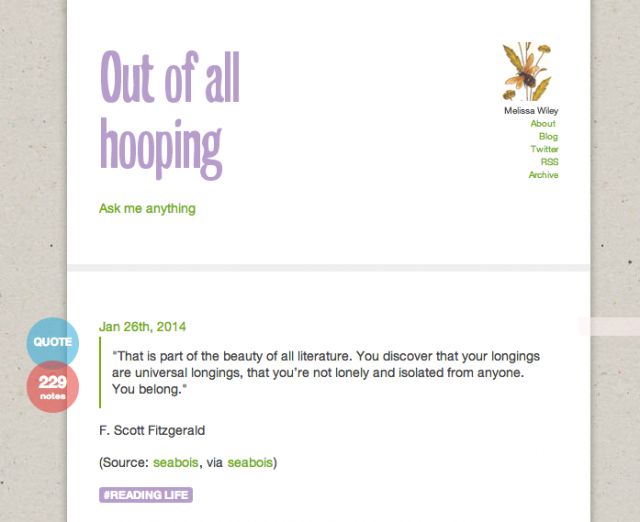It occurred to me that I could use the voice-record feature on my phone to dictate a quote directly into Evernote. Then, later, when I’m back at my laptop, I can clean up the typos (voice recording always generates some gems) and paste the quote into my Tumblr, which, as I mentioned the other day, I’ve decided to try out as my commonplace book.
I’m still using my tumblr to collect other articles as well, but I’m using a tag to collect all the book quotes I want to hold on to. So far, I’m enjoying the process: the format encourages me to add my own thoughts below a quote, if I wish, but there’s no pressure.

Bee avatar from Lesley Austin of Wisteria & Sunshine
Ryan Holiday on How And Why To Keep A “Commonplace Book”:
A commonplace book is a central resource or depository for ideas, quotes, anecdotes, observations and information you come across during your life and didactic pursuits. The purpose of the book is to record and organize these gems for later use in your life, in your business, in your writing, speaking or whatever it is that you do.
Some of the greatest men and women in history have kept these books. Marcus Aurelius kept one–which more or less became the Meditations. Petrarch kept one. Montaigne, who invented the essay, kept a handwritten compilation of sayings, maxims and quotations from literature and history that he felt were important. His earliest essays were little more than compilations of these thoughts. Thomas Jefferson kept one. Napoleon kept one. HL Mencken, who did so much for the English language, as his biographer put it, “methodically filled notebooks with incidents, recording straps of dialog and slang” and favorite bits from newspaper columns he liked. Bill Gates keeps one.
Not only did all these famous and great individuals do it. But so have common people throughout history. Our true understanding of the Civil War, for example, is a result of the spread of cheap diaries and notebooks that soldiers could record their thoughts in. Art of Manliness recently did an amazing post about the history of pocket notebooks. Some people have gone as far as to claim that Pinterest is a modern iteration of the commonplace book.
Fun to hear thoughts on this topic from someone outside homeschooling circles. Apart from a few quiet book bloggers, nearly everyone I know who is familiar with or interested in commonplace books is a homeschooler.
I’ve tried many interations of the practice over the years. (This recent Onion piece made me laugh, because I relate all too well to the feeling that just the right notebook and just the right pen will make, this time, all the difference—only re quote-keeping rather than creative writing.)
It’s always the copying out by hand that gets me. I bookmark quotes all over the place (via Diigo, Tumblr, or Evernote, depending on whether I want to share them, if indeed I want to share them at all). And I highlight the dickens out of the things I read on Kindle. But as methods go mine are pretty scattered—and, except for the Kindle highlights, only cover my internet reading. I’ve no single place to go to pore over passages that have struck me in, you know, books made of paper.
Mental Multivitamin has made a consistent practice out of commonplace-book-style blog posts for some ten years, recording quotes that struck her in the books she has read. Would that I had followed her example. The paper-loving side of me craves a handwritten version, but realistically I know myself (and my achy wrists) well enough to know that I would wind up with that dogeared stack of waiting books Ryan mentions in his post—the very thing he cautions you to avoid. Typing is always going to work better than writing, for me.
I wonder if I would keep up with a Commonplace Tumblr? Typing or pasting book quotes into that platform? Same principle, easier on the wrists. It would certainly be a steadier use of my tumblr than the haphazard link-collecting I do there. (My original vision for my tumblr back in 2009—good grief, has it really been that long?—was to collect links to all the reading I do online, or all significant reading, at least: a companion to my reading log. That didn’t pan out over the long haul.)
***
I began this post a couple of days ago and have since decided to give it a try. I’ve hit the reset button on my tumblr (figuratively) and am going to try to copy out book quotes into once or twice a month. It’s an experiment; I may lose steam after a while, but we’ll see.
(I could do it here instead, but when I post things here I feel more pressure—entirely self-imposed—to add my own commentary. Over there I don’t seem to mind tossing a quote onto the page and letting it speak for itself. Then, if I have more to say—as indeed turned out to be the case with the article above—I can bring it over here and expand upon it.)
***
While finishing up this post just now, I was amused to find “commonplace book” among my categories. I probably made a similar resolution years ago. Didn’t take, obviously.
Surely we all occasionally buy books because of a daydream we’re having—a little fantasy about the people we might turn into one day, when our lives are different, quieter, more introspective, and when all the urgent reading, whatever that might be, has been done. We never arrive at that point needless to say…
More Baths, Less Talking by Nick Hornby
That is part of the beauty of all literature. You discover that your longings are universal longings, that you’re not lonely and isolated from anyone. You belong.
—F. Scott Fitzgerald
“The difficulty of getting rid of even one half of one’s possessions is considerable, even at removal prices. And after the standard items are disposed of—china, rugs, furniture, books—the surface is merely scratched: you open a closet door and there in the half-dark sit a catcher’s mitt and an old biology notebook.”
—E.B. White, “Removal,” One Man’s Meat

“…you should think of will-power as something that never exists in the present tense, only in the future and the past. At one moment you have decided to do or refrain from an action and the next moment you have already done or refrained; it is the only way to deal with will-power….I offer this advice without fee; it is included in the price of this book.”
—Mrs. Hutchins, the narrator of Muriel Spark’s A Far Cry from Kensington
Early this morning, too early, while The Baby Who Scoffed at Sleep played on the bed beside me, I finished reading Willa Cather’s splendid novel My Antonia. The book was due back at the library yesterday, but I want to copy a few passages into my commonplace book first. This is one of them.
I can remember exactly how the country looked to me as I walked beside my grandmother along the faint wagon-tracks on that early September morning. Perhaps the glide of long railway travel was still with me, for more than anything else I felt motion in the landscape; in the fresh, easy-blowing morning wind, and in the earth itself, as if the shaggy grass were a sort of loose hide, and underneath it herds of wild buffalo were galloping, galloping…

